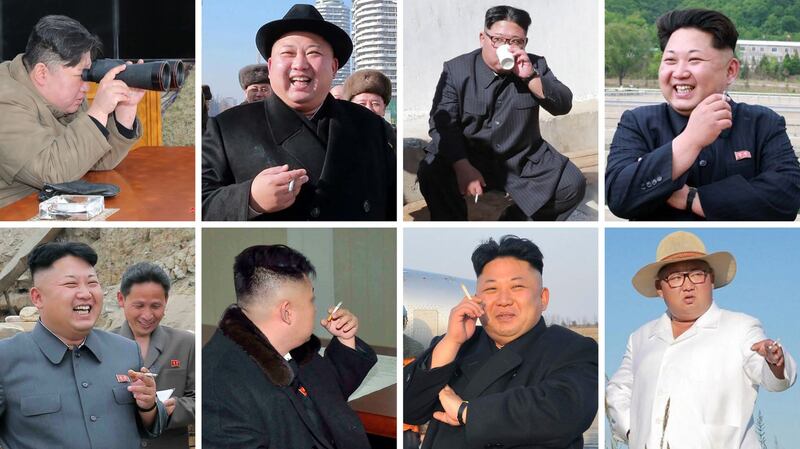North Korean authorities are cracking down on women for smoking in public, saying they are promoting capitalist culture and extinguishing socialist morals, residents in the country told Radio Free Asia.
But the same thinking does not seem to apply to men. The country’s supreme leader, Kim Jong Un, for example, is a chain smoker often seen in state media holding a lit cigarette.
In North Korea, it is natural for men to smoke, but frowned on for women to do the same, sources told RFA.
Statistics as recent as 2020 seem to confirm this trend, with 46.1 percent of North Korean men self-reporting that they have used tobacco –compared to zero women– according to a report by 38 North, a publication of the Washington-based Stimson Center think tank.
But these days, more women are lighting up in front of other people, and authorities are enforcing anti-public-smoking laws on women but not on men.
“Even if the authorities try to [enforce a ban], it doesn’t stop men from smoking, but recently they are catching women smoking too,” a source in the northwestern province of North Pyongan told RFA on condition of anonymity for security reasons.
“The authorities have been cracking down since early this month as more and more women smoke [in public], mainly in the city,” she said.
Anti-smoking laws
In 2005, North Korea passed the Tobacco Control Law, which made it illegal to smoke in hospitals and medical clinics, and on public transportation. This did little to prevent public smoking in other areas.
In a move that was publicized as beneficial for public health and the environment, the country introduced the Tobacco Prohibition Law in 2020, which regulated production and sales of cigarettes, designated more public spaces where smoking is banned, and laid out detailed punishments for smoking in public.
Manufacturers and male smokers were largely allowed to ignore the law, as the firms were responsible for generating revenue for the state, which is only possible if smokers can light up.
Plus, RFA reported in 2020 that North Koreans privately called the anti-smoking laws hypocritical because Kim Jong Un is often pictured in state media puffing away on cigarettes, including in front of children at an orphanage he was visiting around the time the law was passed.

But a recent rise in public smoking by women is the cause for the recent crackdown, which has police monitoring places like restaurants and marketplaces, the North Pyongan resident said.
“This is the first crackdown like this,” she said, and described a June 10 incident where two women in their 40s were fined 30,000 won (US$3.60) for smoking after eating a meal at a restaurant in the city of Sinuiju, which lies on the border with China.
“The police warned them that if they are caught smoking again they will be fined 100,000 won ($12) and if they are caught a third time they could be imprisoned at a disciplinary labor center for a month,” the resident said.
Targeting the wealthy
In the city of Anju, in South Pyongan province, police are even going undercover to try to catch women smoking, a resident there told RFA on condition of anonymity to speak freely.
“Since the beginning of this month, social security agents in civilian clothes have been visiting every restaurant near the provincial arts theater in Anju,” she said. “Many artists and rich people [go there] and many of the women smoke cigarettes.”
The South Pyongan resident said that until recently women who smoke did so secretly, but now they are smoking in front of others. She attributed the rise in female smoking to the greater stresses they face earning money to feed their families.
In the past, North Korean men could expect to support a family with the income from their government assigned jobs, but this became impossible after the economic collapse that led to the 1994-1998 North Korean famine.
Rapid inflation since then rendered the men’s salaries nearly irrelevant, so it has fallen on the women to make money by operating their own businesses, and a nascent market economy has since emerged.
Modern women
So now, women who smoke are seen as more modern than their counterparts of yesteryear, the South Pyongan source said.
Smoking among women is also a sign that women are rebelling against an oppressive society pressure that has consistently suppressed their desires, Yoon Bo Young, a researcher who focuses on North Korean women and society at South Korea’s Dongguk University, told RFA.
“As women’s rights are expanded and women’s abilities are demonstrated, women act to break taboos,” said Yoon. “From that point of view, a woman who smokes should be recognized as a modern woman in North Korea. This is a society where hair must be neatly tied and women must wear appropriate clothes.”
Despite the obvious harmful health impact of smoking, doing so in public can be seen as a way for women to assert their independence.
Yoon noted that in Korean culture, smoking has traditionally been considered a male pastime, but now fewer female smokers are hiding their habit in South Korea as well.
She predicted that women feeling comfortable enough to smoke in public will cause more cracks in North Korean social norms.
Translated by Claire Shinyoung Oh Lee. Written in English by Eugene Whong. Edited by Malcolm Foster.
